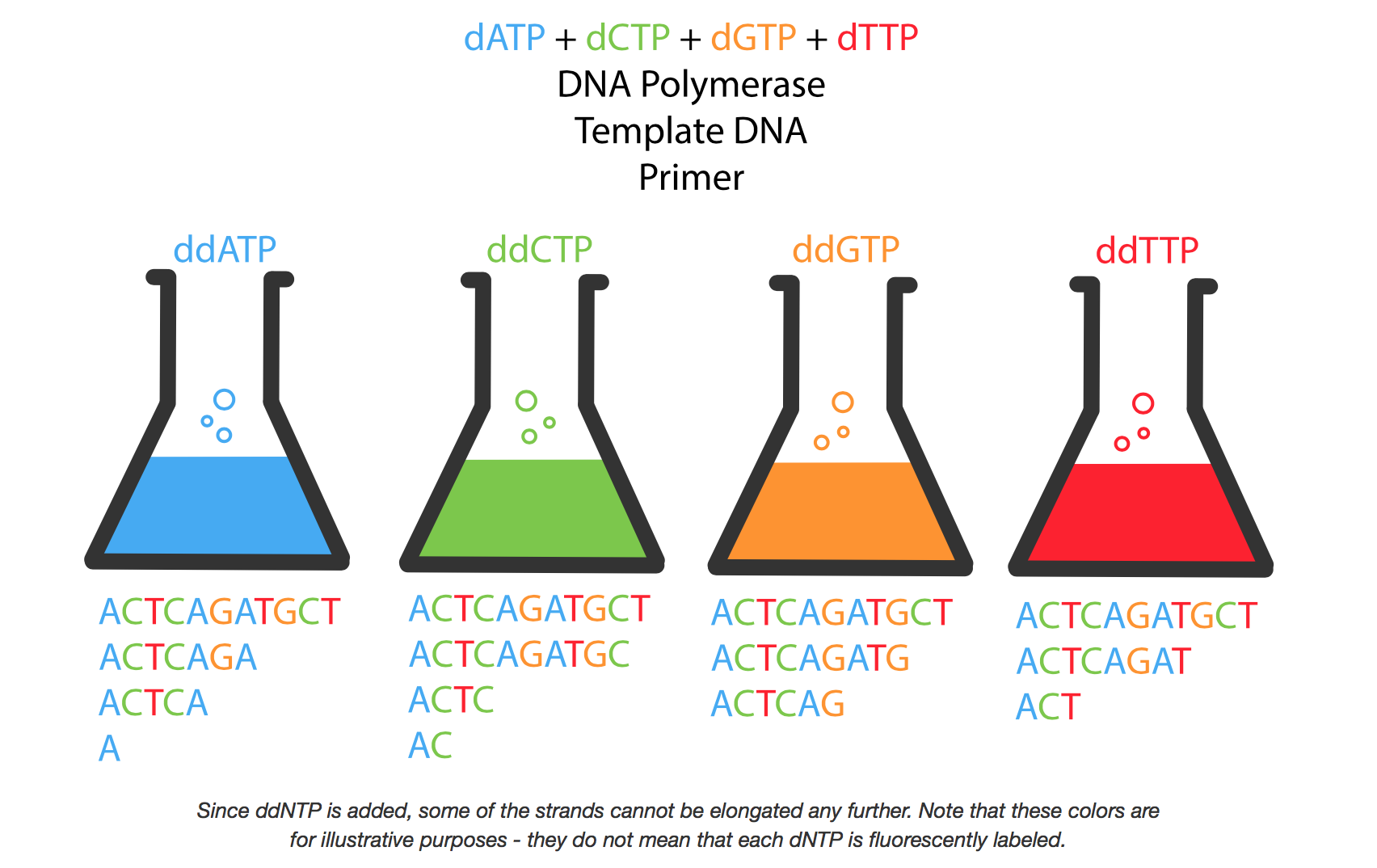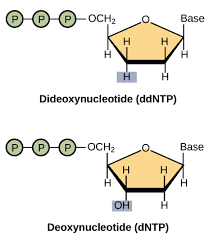How would your genome be sequenced?
Nowadays, you can get your genome sequenced for around $1,000 and the price is dropping significantly. It is foreseeable that genome sequencing could be available to everyone and become a regular medical procedure. This would allow a very personalised branch of medicine, where each individual knows what diseases they are particularly susceptible to and what genes they have which could predispose them to certain conditions like heart disease and cancer. Is this something that you would be interested in? How would you change the way you live if you knew what diseases you were most likely to get? Would you want your genome sequenced?
Method of sequencing DNA
The mechanism by which DNA is sequenced is remarkably simple. The method in use today is based on the techniques of Fred Sanger, which he developed in 1977, for which he won a Nobel prize.

Figure 1. Sanger dideoxynucleotide sequencing
The Sanger method relies on the fact that DNA polymerase can incorporate 2’3’- dideoxynucleotides (ddNTPs) into growing DNA chains. However, as the dideoxy does not have a 3’ OH group, it terminates the chain. In the original technique (first used to sequence a small viral genome), four reactions were set up in which DNA synthesis of the DNA of interest was primed by a synthetic oligonucleotide. Dideoxynucleotdies are shown in figure 2 below.

Figure 2. Doexynucleotide vs Dideoxynucleotide
The basic principle is that each of the 4 coloured pots (in figure 1) contain normal nucleotides, DNA polymerase (which adds on nucleotides to a growing chain) and a primer (to help the DNA polymerase begin adding nucleotides). However, each of the contains a separate dideoxynucleotide (one for each of the 4 bases). This means in the blue pot, which contains ddATP, the chain will be terminated only at the base A (adenine) in the DNA chain (seen in figure 1). Likewise in the green pot, which has only ddCTP, the chain is only terminated at C bases in the DNA chain.
But hang on, if a ddNTP terminates the chain, how can you be sure that it will be incorporated at each length?
The cycle is repeated lots of times, and through probability this can almost guarantee that a dideoxynucleotide will be inserted into every possible base position.
So, now what?
We are left with 4 tubes, one for each base, that contains strands of all different lengths, each terminating at a specific nucleotide. All that is left to do is run a gel electrophoresis that separates DNA based on its length. Shorter fragments move more quickly through the gel, while longer fragments are much slower. An example of this gel electrophoresis based on the same sequence of DNA used in figure 1 is shown below.

Figure 3. Gel electrophoresis of the same sequence of DNA in figure 1
More recently the methodology has been enhanced by using ddNTPs conjugated with specifically-coloured fluorescent markers. This enables a sequencing reaction to be assembled in one tube and detection to be automated. Another change has been to use fine capillaries for separating the DNA fragments, rather than large gels.
As the cost of DNA sequencing gets ever more affordable, the idea of personalised medicine starts to become a reality. With this comes many moral dilemmas. Would you want to know if you were likely to get heart disease? How would this change your behaviour? Would you start to worry about how you life your life?
Would you want your genome sequenced?
References:
https://binf.snipcademy.com/lessons/dna-sequencing-techniques/sanger-dideoxynucleotide
https://www.khanacademy.org/science/biology/biotech-dna-technology/dna-sequencing-pcr-electrophoresis/a/dna-sequencing
https://en.wikipedia.org/wiki/Frederick_Sanger#Sequencing_RNA
https://en.wikipedia.org/wiki/Whole_genome_sequencing
http://www.genomenewsnetwork.org/resources/whats_a_genome/Chp2_2.shtml
This is greatly thought provoking @ovij. I am reminded of a saying
But, this knowledge could have both positive and negative influence on behaviors, in my opinion. I think it would be determined by the nature and severity of the illnesses each of are are predisposed to. Thinking that you will become sick at some point, to me, is willing sickness into your life. The power of our thoughts can not yet be measured.
It reminds me of studies that has shown that some individuals with DID (multiple personality disorder) have shown a person to have allergies and one or more of their alter-personalities did not have allergic reactions.
Could be a window into the psychosomatic realm? Can our Body and mind create and extinguish disease based on factors that we do not yet understand? It is pretty intriguing to think about.
Thanks for sharing your thoughts and this great article @ovij!
I completely agree with you @grow-pro. That quote sums up my thoughts exactly. Obviously there could be many benefits to knowing what diseases you might be prone to getting. However it may become a self-fulfilling prophecy and actually contribute to the development of the disease.
The study about DID is very interesting indeed. The idea that many physiological illness that can actually be brought on by psychological trauma seems strange, but it is something that I think is definitely possible.
Thank you for commenting and adding your thoughts, they are always welcome!
Nice information....& a lot of chemistry stuff described simply..
Thank you, I do find it really difficult to try and describe some quite complicated biochemical processes in a simple manner. I am glad it is understandable at the very least!
You sure know your stuff! Welcome to steemstem if you haven't already been told that!
Yeah genome sequencing is nothing but amazing but it does come with some incredible philosophical and ethical issues that could transform how we even define existence. Pretty incredible to think about
Thank you for the comment. I think whole genome sequencing could have major benefits in medicine, if used correctly. It could bring great personalisation of care that might make a great impact on survival rates.
I agree it is incredible to think about all the possible applications.
This gem of a post was discovered by the OCD Team!
Reply to this comment if you accept, and are willing to let us promote your gem of a post!
If you accept this, you'll be nominated and the members of the OCD team will vote on whether we'll feature your post in our next compilation post.
You can follow @ocd – learn more about the project and see other Gems! We strive for transparency.
I'm mostly curating in #science and am always glad to see quality posts like yours peeking out between the garbage and plagiarism!
Thank you so much for reading my post and recognising it, you are more then welcome to promote this post on OCD!
Something very new I am hearing of. I have never heard of this before. Thanx for sharing